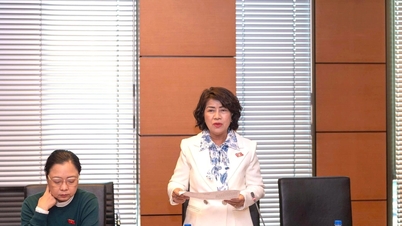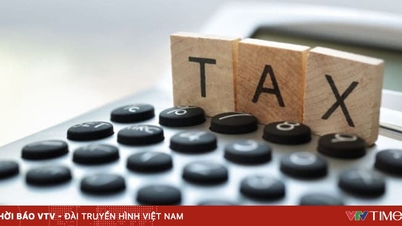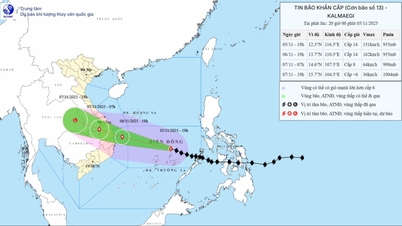
Delegate Tran Van Lam - Photo: National Assembly
In the draft Law on Tax Administration (amended), the Government proposed to apply tax calculation based on a percentage of revenue after implementing the policy of abolishing lump-sum tax. Delegate Tran Van Lam ( Bac Ninh ) said that the amendment policy is reasonable, but will be extremely burdensome for business households, especially small and medium-sized businesses - which are vulnerable groups.
Unreasonable compared to business accounting and bookkeeping
According to delegates, small businesses mainly earn a living and have a source of income to meet basic family spending needs, so they are a vulnerable group and have to suffer from unreasonable taxation.
Because if we compare the percentage of revenue that business households must pay with enterprises and units that implement a full accounting regime, the tax rate to be paid/revenue of business households will be many times higher than that of this subject.
Mr. Lam said that the bill has not yet provided full figures and impact assessment, but if we do the calculations, we will clearly see the "injustice" when the tax rate that business households have to pay is higher.
For example, the profit/revenue of a normal business household is 3-5%, at best 10%, if the tax rate is 1-5%, that means "all the profit" of the business person is gone.
Therefore, delegates suggested considering determining appropriate tax rates corresponding to tax payers on turnover, so that business households are not disadvantaged compared to enterprises.
At the same time, it is necessary to carefully calculate, clearly state the basis and legal basis for tax imposition, have policies to protect the weak, those who do not have the conditions to do large business, and have full accounting to support this group when the lump-sum tax is abolished.
In addition, Mr. Lam also said that the regulation on the threshold of non-taxable revenue of households and individuals doing business in the Personal Income Tax Law is unreasonable.
Also because for normal people who do not do business, income from 10-11 million/month must be calculated personal income tax.
Meanwhile, for business people, if the revenue of 200 million divided by 12 months is equivalent to 16.6 million per month, the average profit is 10%, then the actual income is only 1.6 million/month.
"If business income of only 1.6 million/month has to pay tax compared to those with income of 10 million/month in other fields, are we forcing these small business people?
We need to calculate from sales the average income of business people, only about 5-10% that must pay tax, while they also have small children, old parents, are they entitled to family deductions? Having to pay tax when they just make a profit like that is unreasonable and disadvantageous" - delegate Lam said.
There is a roadmap to support business households.
Meanwhile, delegate Tran Quang Minh (Quang Tri) said that the nature of applying the tax base based on revenue comes from the fact that business households and individual businesses do not have a systematic accounting system, do not have the habit and capacity to fully store invoices and documents of input costs.
The abolition of the lump-sum tax mechanism has been requiring this subject to gradually develop in a more professional direction, implementing Resolution 68, but delegates said that there are risks regarding feasibility, the accounting and tax declaration capacity of millions of business households is still limited; technology infrastructure and data sharing between ministries and branches are not yet synchronized...
If implemented simultaneously, it could lead to overload for tax authorities, errors, tax arrears and even increased compliance costs for small businesses. Therefore, delegates suggested that there should be a roadmap for conversion according to each scale group, combined with technical support, simple accounting, and free software for small businesses.
Delegate Tran Thi Hien (Ninh Binh) is concerned that for micro-enterprises or household businesses with little accounting system and limited human resources, switching to immediate declaration could create a huge burden in terms of compliance costs, having to manage books, electronic invoices, etc.
Therefore, delegates suggested that the regulations should be carefully studied to ensure they are consistent with the spirit of Resolution No. 68 and the goal of improving people's lives. A transitional period should be determined specifically for business households and micro-enterprises, possibly within 1-2 years, such as simple declaration, or tax authorities should support declaration on their behalf with available data.
At the same time, consider and supplement regulations on support for compliance cost exemptions (free electronic invoices, technical support, training) for small and micro enterprises in the initial stages of transformation.
Source: https://tuoitre.vn/dai-bieu-cho-rang-ap-thue-theo-ti-le-doanh-thu-ho-kinh-doanh-nho-le-thiet-thoi-20251105170923282.htm


![[Photo] Opening of the 14th Conference of the 13th Party Central Committee](https://vphoto.vietnam.vn/thumb/1200x675/vietnam/resource/IMAGE/2025/11/05/1762310995216_a5-bnd-5742-5255-jpg.webp)






































![[Photo] Panorama of the Patriotic Emulation Congress of Nhan Dan Newspaper for the period 2025-2030](https://vphoto.vietnam.vn/thumb/1200x675/vietnam/resource/IMAGE/2025/11/04/1762252775462_ndo_br_dhthiduayeuncbaond-6125-jpg.webp)





































































Comment (0)